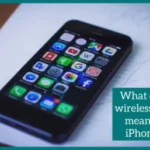The internet, a sprawling and ever-evolving linguistic ecosystem, constantly births new acronyms and initialisms. Among these, “GTF” holds a prominent, albeit often impolite, position. Decoding its meaning requires a foray into the realms of online slang and digital communication. The interpretation hinges heavily on context, tone, and the relationship between the interlocutors.
At its core, “GTF” stands for “Go To F***.” This phrase is undeniably vulgar and serves as an emphatic dismissal or a harsh imperative. It is rarely, if ever, intended as a compliment. Its severity can range from playful banter amongst close friends to a hostile confrontation between adversaries. The nuance is crucial for proper interpretation.
Consider the various content readers might encounter featuring this abbreviation:
1. Social Media Exchanges:
Social media platforms are breeding grounds for acronyms like “GTF.” A post on X (formerly Twitter), Instagram, or Facebook might showcase a heated debate in the comments section. One user, frustrated by another’s viewpoint, might retort with a simple “GTF.” In this context, it’s a clear indication of disagreement and a desire to end the conversation abruptly. The brevity amplifies the impact.
Furthermore, in meme culture, “GTF” could be incorporated into image macros or short video clips. These instances often employ the phrase ironically or humorously, softening its blow. For instance, a meme showing a character being rejected might use “GTF” as a comedic representation of their internal monologue. The visual element provides a buffer, lessening the offense.
2. Online Gaming Environments:
The competitive nature of online gaming often precipitates the use of coarse language. Within multiplayer games, such as first-person shooters or MOBAs, players might use “GTF” to insult or belittle opponents. The intention is often to distract, demoralize, or tilt the opposing team. Voice chat amplifies the impact, adding vocal inflection to the potentially aggressive message.
Conversely, “GTF” might also feature in more lighthearted gaming communities. Among established friends or guildmates, it could function as a playful jab or a mock-insult. The history of the relationship softens the blow, rendering it less offensive and more akin to friendly ribbing. The intent is to amuse, not to denigrate.
3. Text Messages and Direct Messaging:
Text messages and direct messaging apps, such as WhatsApp or Discord, offer a more intimate setting for communication. The use of “GTF” here depends heavily on the established relationship between the sender and recipient. Amongst close friends, it might be used jokingly, especially if coupled with emojis or other softening elements. A rolling eyes emoji can completely alter the connotation.
However, in a professional or formal setting, the use of “GTF” is almost invariably inappropriate. Sending such a message to a colleague, supervisor, or client could have serious repercussions, potentially leading to disciplinary action or damage to professional relationships. The context demands decorum.
4. Online Forums and Discussion Boards:
Online forums and discussion boards often have specific rules and guidelines regarding acceptable language. Moderators typically prohibit the use of overtly offensive terms, including “GTF.” However, depending on the community, it might be tolerated in certain contexts, particularly within subforums dedicated to humor or venting.
Moreover, “GTF” might be used in discussions about controversial topics. Individuals expressing strong opinions might resort to using the phrase to shut down opposing viewpoints. In these cases, it often reflects a lack of willingness to engage in constructive dialogue. The online environment can embolden users to employ language they would otherwise avoid.
5. Academic or Literary Analysis (Rare):
While rare, “GTF” might appear in academic papers or literary analyses focusing on internet culture, slang, or digital linguistics. In such instances, the author would likely analyze the phrase’s origins, usage patterns, and sociocultural implications. The context is strictly academic, treating the phrase as an object of study rather than an expression of personal sentiment. Detachment is paramount.
The prevalence of “GTF” in online content underscores the importance of understanding its various connotations. Context is paramount. Deciphering the intent behind its usage requires careful consideration of the relationship between the communicators, the platform being used, and the overall tone of the conversation. While seemingly simple, “GTF” embodies the complexities of digital communication and the evolving landscape of online language.









Leave a Comment